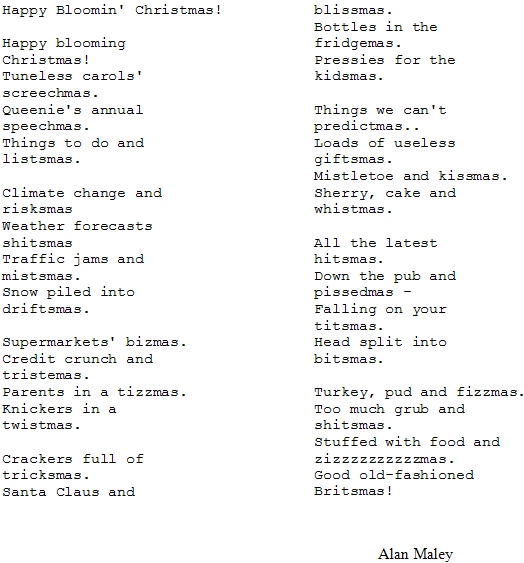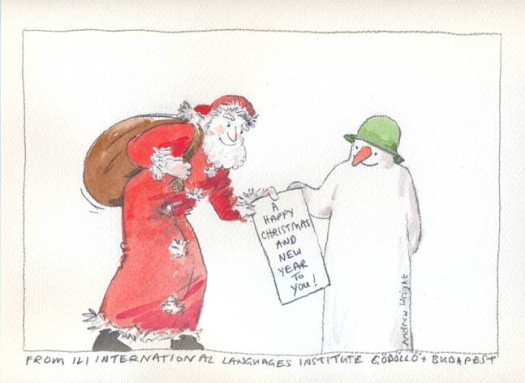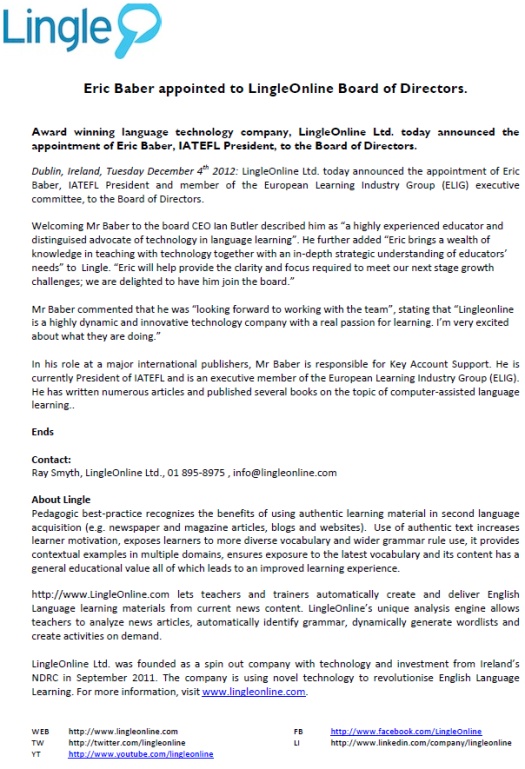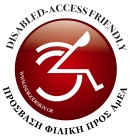Editorial
Letters 1 and 2 are examples of some of the Christmas greetings we have received.
Letter 1

Letter 2


Andrew Wright
Letter 3
Editorial
Marttin Wolff was a regular contributor to HLT and made a great impact on EFL in China.

Dear Friends/Brethren of Dr. Martin Wolff,
With a saddened heart, I am informing you that our beloved and honorable friends/brethren, Dr. Martin Wolff has returned home with the Lord on August 23, 2012 at the age of 65.
It is comforting, however, to know that his departure due to heart failure was painless and peaceful while sleeping in his bed. His funeral was well taken care of by Taizhou Teacher College and the USA Shanghai Consulate Citizens Services Section after due consultation with his family in the USA.
Special appreciation goes to Taizhou Teacher College and especially to its director Arthur Lee who wholeheartedly took care of the whole funeral and cremation service for Dr. Martin in the Christian way. Even though Dr. Martin still had not started his teaching in this college, they accorded the honor and respect to Professor Martin who had dedicated his last 11 years teaching English in China and helping thousands of young students find their way and dream for their future.
Dr. Martin's spirit will continue to live through his proprietary teaching program of Holistic English which he tailored to help teaching Chinese college students the language as well as the associated cultural values.
May God bless China abundantly!
To God alone be all the glory!
Rolland Lau
(Friend/co-worker of Dr. Martin since 1999/"Holistic English" teacher)
E-mail: laurolland@yahoo.com
Letter 4
Editorial
Simon Greenall is an ELT textbook writer and a past President of IATEFL (1997-1999). His work for Macmillan Education includes the Reward series, and he is the co-editor in chief of New Standard English, a Junior and Senior High coursebook series for China, and New Standard College English for Chinese universities.
PRESS RELEASE
Simon Greenall awarded OBE for Services to English Language Teaching
Macmillan Education is delighted by the news that Simon Greenall has been awarded an OBE for services to English Language Teaching. Greenall’s royal recognition for his work in ELT was announced in the New Year Honours list on 29th December 2012. On receiving the news, Greenall responded:
“I’m extremely honoured to receive an OBE for services to English language teaching. Obviously, the work I’m most passionate about is publishing and over the past thirty years I’ve had the privilege of working with teachers using our books in countries all over the world.”
As an ELT textbook writer and advisor, Greenall has worked extensively for Macmillan Education. “My great privilege in recent years has been working with Macmillan for the Palestinian Ministry of Education”, says Greenall, “as well as on a series of school and university textbooks used all over China for Foreign Languages Teaching and Research Press in Beijing”. Apart from his work in publishing, Greenall served as president of IATEFL on the Board of Management of the ELT Journal, and he is now on the Board of Trustees of International House.
Greenall remains characteristically modest about his achievement:
“I’m not sure if I deserve the award, but I’d be happy to accept it to celebrate the work of everyone in our vibrant, exciting profession, which changes the lives of people and their countries in such a benign and positive way.”
Simon Allen, CEO of Macmillan Education, is delighted to hear about Greenall’s appointment:
“Macmillan Education would like to express our sincere thanks for the valuable contribution Simon has made to Macmillan’s publishing direction over many years. His input has led to the success of collaborative projects such as those with our partners the Foreign Language Teaching and Research press in China, right through to his advisory capacity on so many of our worthwhile projects such as English for Palestine. It’s a richly-deserved award.”
Letter 5
Hi Hania,
We're delighted to announce that Eric Baber, president of IATEFL has joined the board of LingleOnline. Eric will help provide Lingle with the clarity and focus required to meet the challenges of our next stage growth.
Please see the attached press release for further details.
Kind regards
Ian Butler

Letter 6
Dear Hania
I've just produced an Apple iBook, entitled eHandbook (I was going to call it iHandbook but Apple wouldn't allow that), outlining the ways teachers can use Apple's iBooks Author to create learning material in the form of an iBook, downloadable to an iPad. This can be useful to your readers, principally those who already use Macs, but particularly also for those who may be thinking of getting a Mac.
Here's a link to the book on iTunes:
https://itunes.apple.com/us/book/ehandbook/id582451496?mt=11&ign-mpt=uo%3D4
I hope you find the iBook worthy of a review
Mark Addison
Hilderstone College
Broadstairs
Letter 7
Hello Hania,
I watched the video with you and Paul Davis about the new book.
www.youtube.com/watch?v=QocLmWUkqbs
I loved Paul's way of illustrating how the lexis comes first followed by the grammar.
Also, it was interesting reading how excited everyone was by Michael Lewis' initial explanation of the concept but how the method of implementation left a lot to be desired and how this book bridges the gap and has made the concept a reality for teaching.
I'm looking forward to buying it myself soon - I know the logic and benefit of teaching chunks but am not yet sure how to organise it. I don't want to deny my students any longer!
Best wishes to you in Gdansk or wherever you are when you read this.
Peter Shaw
Letter 8
Hi Hania,
(…) The project AccreditedOnlineColleges.org is a general information website with many resources useful to all people looking to further their education. The site discusses the offline and online educational paths one can follow to obtain a degree from an accredited institution. As a valuable resource to anyone interested in pursuing a degree, I thought the project could be of interest to yourself and others who frequently visit your site.
With October being National Disability Employment Awareness month we recently published an article that we thought would be of particular interest to you:
www.accreditedonlinecolleges.org
Take a look and let me know what you think. If interested, it would be great to see it listed as a resource for those interested to refer to.
Thanks for your help. I look forward to hearing back from you soon!
Heather Costello
Letter 9

Dear Hania
I teach young learners. How is the Disabled Access Friendly campaign useful to me?
When you are teaching young learners, a good course book can provide a great feeling of security, both for the teacher and the students. It gives you the teacher a well organised framework that enables you to deliver the building blocks your students need in order to learn English, and the format and topics used are specially designed to appeal to young children.
But when you became a teacher, maybe you had hoped you would be able to do something more than just teach the English language. For education is not only about acquiring knowledge and skills, it embraces social improvement, respect for others, the promotion of well-being, truth, fairness and equality. Good teachers want to encourage students to realise that they are not helpless to overcome the gaps between ideals and reality. They realise that education should equip children to become adults who will take responsibility for the world they inhabit, and to think and question what they see and hear. An awareness of the world in which we live and the belief that through their own actions students have the ability to make improvements, is at the heart of education. As Marian Wright Edelman, an American activist for the rights of children said, “education is for improving the lives of others and for leaving your community and world better than you found it”.
You may well agree with the above, but you may also be wondering how you can put all this into practice and raise social awareness in the classroom at young learner level in English. After all, your students have very limited English language skills, and because of their young age, cannot relate easily to many topics. This is where the Disabled Access Friendly campaign can help you.
This voluntary campaign focuses on issues of mobility disability and paves the way to changes being made both in attitude and infrastructure so that people with mobility disability are less isolated, have better access to the world, and are empowered to live more independent lives. The campaign’s EFL website, www.disabled-accessfriendly.com, provides teachers with free online lesson plans and reading texts. These can be used as additional material, for project work and examination practice. At the same time they provide students with the information necessary to allow them to put themselves in the shoes of someone with a mobility disability and stimulate them to understand others and to think how others feel.
Why not consider using some of the campaign’s graded reading texts in parallel with your course book? These texts combine the following elements:
- Language suitable for A1/A2 level
- Topic appeals to young children
- Text prompts children to think about issues facing people with mobility disability and to consider attitudes and behaviour towards people with mobility disability.
It may be helpful at this stage to have a look at some of these texts in more detail, so you can see how you could use these with your students.
A reader entitled “A dog on wheels” is about a dog whose back legs are injured and it is therefore harnessed to wheels so it can move. The text provides practice of the present simple tense, and uses very simple vocabulary. The dog’s friends ask it inappropriate questions about its disability, and make various assumptions. The text indirectly provides children with information about how a wheelchair user feels and how to behave towards someone with a mobility disability.
“Party time” talks about a little girl getting ready for a party. Like all children, she takes great pleasure in making herself look pretty. The text provides practice of the present simple tense and uses vocabulary about clothes and appearance . At the end, it is revealed that the child is a wheelchair user, and feels she is made unattractive by her wheelchair. The text puts the reader in the position of the little girl, prompting the reader to think about issues she faces and how she feels.
Accessibilty is the topic of a text entitled “A schoolboy sits alone at school”. This is based on a newspaper article reporting on a young wheelchair user who was unable to reach his classroom at school because of a broken lift. The text practices the present simple, can and can’t, and the future with will, and uses adjectives expressing feelings. Students are prompted to consider issues of accessible infrastructure and how lack of access can isolate and disempower a wheelchair user.
“Babies love learning about the world” practices the present simple, the present continuous and the modal verb can. The text talks about how babies reach, grab, crawl and learn to walk, and how these skills enable them to explore their environment. Readers are introduced to a baby who is unable to do all these things because of a mobility disability, but who has the same instinctive desire to do so. There is a link to a YouTube clip showing a kind of wheelchair for babies that enables them to move around by operating a joy stick. The text indirectly shows how someone with a mobility disability is restricted in reacting with his environment, and also how technology can help.
If you are teaching adverbs of frequency, you could use a text entitled “Video games”. This briefly touches on the subject of assistive technology, which can help children with disabilities use a computer. It also talks about how a wheelchair user can improve his skills at manoeurvring his wheelchair by playing a specially designed video game. The idea that successfully operating a wheelchair can be a challenging skill to obtain is probably a new one to most readers.
The best teachers have always done more than just prepare students for tests. They raise awareness of the world in which we live and try to make it a better place. We invite you to visit our site www.disabled-accessfriendly.com for material to help you be one of those teachers.
Katie Quartano



|